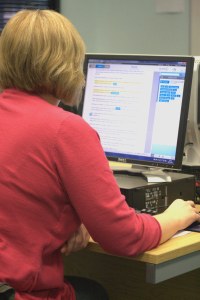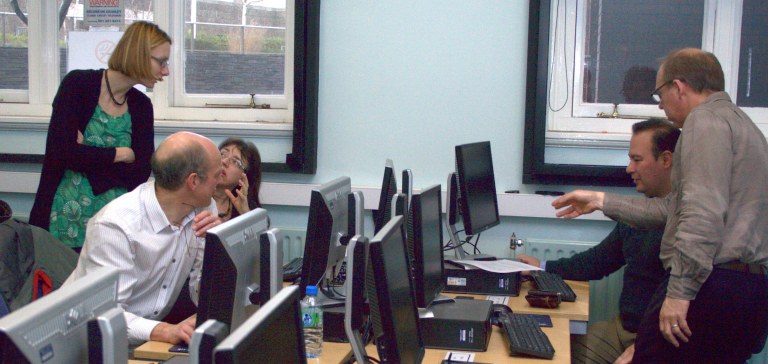 ‘Brilliant, engaging, authentic – thank you!’
‘Brilliant, engaging, authentic – thank you!’
This year’s Winter School, our sixth, has been the best attended of any we have run so far which was really pleasing for the team. We’ve met lots of new colleagues over the two weeks and been inspired by the kinds of things people want to do with technologies for their learning and teaching. Feedback from the sessions has given us some great ideas on how to develop our workshops and also the kinds of things people would like to find out more about, that’s why we collect it, so we’ll be scheduling in workshops on Evernote and technologies for polling over the next few months for starters. To keep up to date with when workshops are running you can follow us on Twitter (link below), follow us on this blog, keep an eye on the University Announcements page and also search the CLL Booking page here.
‘Lots of showing and sharing of experiences – colleagues sharing their use of various tools… Learning about those tools and trying them out.’
Our aim is to make the Winter and Summer schools a mix of introductory and more exploratory sessions, providing opportunities for staff to extend themselves. In the feedback we get, staff report a valued feature of the sessions is the opportunity to try out new tools and systems, to discuss the strengths and limits of these, how these can be trialed and then made a part of learning and teaching practice, and to share and learn from what colleagues in other schools and departments are interested in and are doing. We are also delighted to read about the wider impact and reach our sessions have in a range of contexts, from enriching personal practice, to staff championing in schools and departments the ideas and knowledge they gain, to applications for research groups.
‘I came to build up professional knowledge and skills for my own personal development and I think this will definitely come in useful in the future.’
‘This will quickly enable myself and other module leaders to elevate the skills of our students…’
‘Immediate use to help a research collaboration (2 UK sites, 2 European) meet and collaborate. I will include this system as a way of indicating how we will collaborate – thus strengthening a bid for funding. I will explore using this for T&L in a European meeting to demonstrate some of our T&L content.’
Another way we’ve responded to the feedback we get has been developing an advanced session on using Twitter, following a brace of well attended introductory Twitter sessions over the summer. We ran this in the winter school and knowing that it is crucial to include local examples of good practice we enlisted the help of Zelda Chatten, who is part of the team that supports the Library’s social media presence. Between us we were able to share practical tips and useful advice about our experiences using Twitter.
This was a fruitful partnership which extended the range of sessions we run collaboratively (we also run an Adobe Connect session with colleagues from CSD) and one which we will repeat and continue to build on, for example we are planning to develop a session jointly-run with CSD colleagues on Stream Capture.
‘The opportunity to explore some very useful tools in a supported way – I left with some great ways to make my slides more visual and engaging and will pass these tips onto others.’
It was also the first time we ran the session ‘Engaging learners visually’ in which Alex and Tünde shared a few tools that you can use to create more exciting, visual slides, including Notegraphy, Piktochart, Prezi, Haikudeck and some features of PowerPoint. We discussed accessibility considerations when putting together pictoral slides. Judging from the attendance and busy keyboard-working during the workshop, it was a lively and useful topic to cover! We will definitely run this workshop again.
‘Hands-on guidance through the set-up, recording, stream process. Also love the well-scaffolded and visual resources laid out on the VITAL page. Great!’
If you attended one of our the Winter School sessions you will be enrolled on our Workshop Resources module in VITAL which will contain at least the slides from the sessions and usually further links and support resources on all of the sessions we run. Our Summer School will be running from Wednesday 7th June until Friday 16th June 2017 and some sessions are already scheduled in to run and are bookable here: https://www.liverpool.ac.uk/cll/booking/
‘Thank you – terrific, inspiring session!’
Thanks to everyone who came along and engaged so positively. We derive much inspiration and learn so much from all of our sessions, which we always strive to make a collaborative venture. But for now, the decorations are stowed back in the loft, the last green triangle Quality Street has reluctantly been scoffed, and the jumper from Santa exchanged for a Star Wars onesie, it can mean only one thing; the eLearning Unit Winter school has been and gone and the festivities over for another year. Hope to see you at the Summer School!
The eLearning Unit team
Follow @elearninglpool


